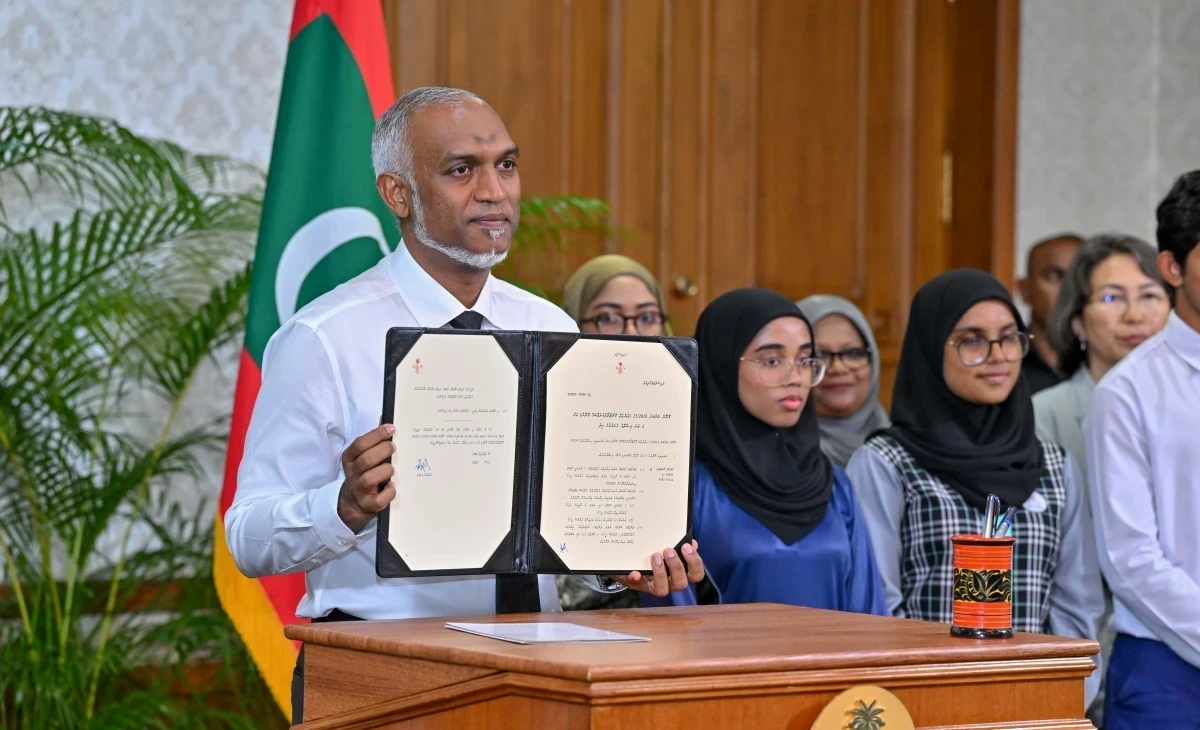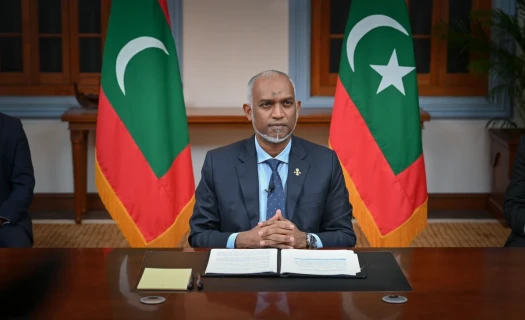Wed, 17 Dec 2025
|DHIVEHI
Nearly two years of building a tobacco-free Maldives: Government drives nationwide reforms
11 Sep 2025
|

President Dr Mohamed Muizzu ratifies amendment introducing generational tobacco ban on 21 May 2025 --- Photo: President's Office
One thing that supporters and opposition alike can agree on is the current Administration’s unwavering drive to build a tobacco-free Maldives, a goal President Dr Mohamed Muizzu has made a signature health initiative.
In November 2024, President Dr Muizzu ratified the First Amendment to the Tobacco Control Act, a sweeping measure that reshaped the country’s tobacco laws. The amendment outlawed the import, sale, free distribution and use of electronic cigarettes and vaping devices, while strengthening long-standing restrictions on conventional tobacco.
Smoking is now prohibited in all Government buildings and on their grounds. Business owners who allow illegal smoking face fines, suspension of smoking permits and even temporary loss of their operating licence. Retailers must verify the age of every buyer and are barred from selling tobacco to anyone under 21 or involving anyone under that age in sales transactions. Advertising in any form, public display of tobacco packaging, cultivation of tobacco plants, production of tobacco products and the import of seeds or equipment for growing or manufacturing tobacco are all banned. Advertising, sponsorship, illegal import or sale carries heavy penalties.
Within less than a year, the Administration strengthened these measures even further. The Second Amendment to the Tobacco Control Act introduced a landmark “generational ban”, placing the Maldives among the most progressive nations in the fight against tobacco.
Before the Cabinet met to consider the amendment, President Dr Muizzu addressed the public, stating that tobacco use is the leading cause of chronic illness and disability in the Maldives and that 84 per cent of all deaths are linked to chronic diseases associated with smoking. He highlighted a national survey showing that 21.8 per cent of Maldivians aged 15 to 29 use tobacco products and cited the Global Youth Tobacco Survey, which found that 45 per cent of school students use tobacco or nicotine. With 30.1 per cent of the population born after 1 January 2007, these figures highlight the country’s duty to protect this generation from the harms of tobacco.
When the amendment takes effect, anyone born on or after 1 January 2007 will be permanently barred from buying or using tobacco. Individuals under 21 will also be prohibited from taking part in any tobacco-related commercial activities. The amendment reinforces the nationwide ban on e-cigarettes and vaping devices, forbids the import or possession of machinery for tobacco production, and outlaws all forms of advertising, sponsorship and promotional activity. Confiscated tobacco products and equipment will be disposed of through a transparent and accountable process designed to maintain public trust.
Legislation is only one pillar of the strategy. President Dr Muizzu has directed ministers to explore a financial-incentive scheme that would reward entire island communities if every resident quits smoking, with cash payments deposited directly into local bank accounts. The Ministry of Health has opened a public consultation on the proposal.
Meanwhile, tobacco cessation clinics are being established in every inhabited island and city, offering counselling and medication supplied through the State Trading Organization (STO) and distributed via hospitals. Additional revenue from higher tobacco taxes will be channelled into these programmes and into treatment for tobacco-related diseases.
These efforts have earned praise at home and abroad. The World Health Organization (WHO) presented President Dr Muizzu with its World No-Tobacco Day Special Recognition Award, citing his “exemplary leadership and steadfast commitment to public health in the Maldives”.
With rigorous laws, community incentives and nationwide support services, the Administration is not merely curbing tobacco use; it is working to end it. The Maldives now stands as a regional model for how determined policy and public engagement can protect future generations and build a healthier society.


Popular News







